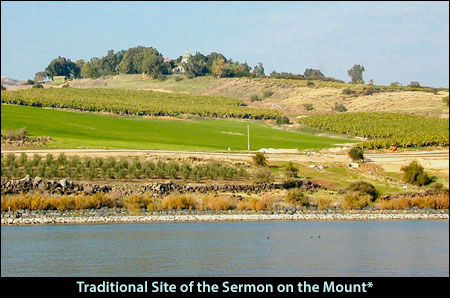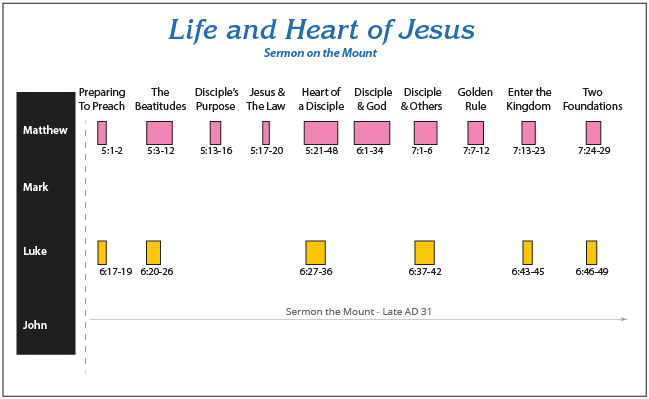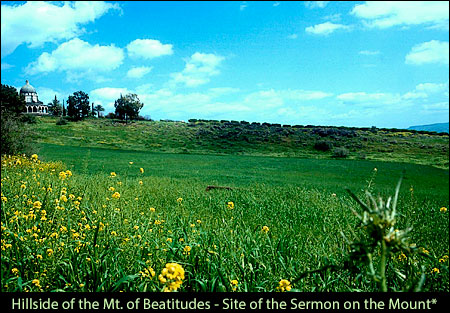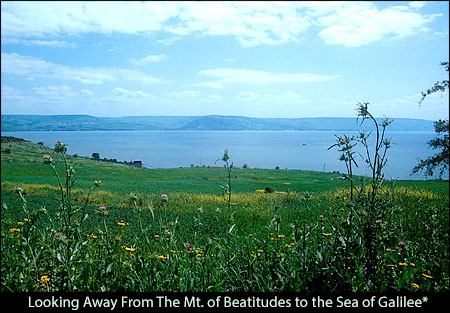The Sermon on the Mount is the first major sermon of Jesus in the gospels. It is recorded in both Matthew and Luke. However, Luke records only portions of the sermon. At this point in our study, both the Pharisees and Herodians are actively planning to murder Jesus. At the same time, Jesus’ popularity is increasing. Just after Jesus left the Pharisees and Herodians for the shore of the Sea of Galilee, a massive crowd of people came to hear Jesus and to be healed by Him. In our last study, Jesus left them and went to the top of a high hill to pray during the night. In the morning He called many of His disciples to join Him. Then He appointed the twelve apostles. This study begins a series on the Sermon on the Mount which Jesus preached just after He selected the twelve disciples.

Setting
The Sermon on the Mount is recorded in Matthew 5-7 and Luke 6. Luke tells us that when Jesus came down the high hill, He stood on a level part of the hillside and was surrounded by the mass of people who wanted to be healed.
Jesus came down with them and stood on a level place; and there was a large crowd of His disciples, and a great throng of people from all Judea and Jerusalem and the coastal region of Tyre and Sidon, who had come to hear Him and to be healed of their diseases; and those who were troubled with unclean spirits were being cured. And all the people were trying to touch Him, for power was coming from Him and healing them all. And turning His gaze toward His disciples, He began to say, “Blessed are you who are poor, for yours is the kingdom of God. Luke 6:17-20 (NASB)
The mass of people must have pressed against Jesus as they tried to reach out and touch Him.
Matthew does not record the events of Jesus’ life in chronological order since he was more interested in a thematic approach. Consequently, he ignored the appointment of the twelve and gave us their names later in Matthew 10:2-4. Therefore when we arrive at Matthew 5, he tells us only that Jesus went up onto the hilltop and ignores Jesus’ night of prayer, His selection of the twelve apostles, His descent down from the top of the hill, and the mass of people who surrounded Him in an attempt to be healed.
When Jesus saw the crowds, He went up on the mountain; and after He sat down, His disciples came to Him. Matthew 5:1 (NASB)
As a result, Matthew tells us only that Jesus went up on the mountain.
Then Matthew records that Jesus finally sat down in order to preach the Sermon on the Mount. This was the typical position in which the rabbis taught. Then Jesus spoke.
He opened His mouth and began to teach them, saying . . . Matthew 5:2 (NASB)

Sermon On The Mount
The Sermon on the Mount is the most quoted section of scripture from the New Testament. It contains the Beatitudes, the Golden Rule, the Lord’s Prayer, and an “eye for an eye.” The beatitudes within the sermon are so popular that others have created their own, such as the following.
Happy are the pushers, for they get on in the world.
Happy are the hard-boiled, for they never let life hurt them.
Happy are they who complain, for they get their own way in the end.
Happy are the blase, for they never worry over their sins.
Happy are the slave drivers, for they get results.
Happy are the knowledgeable men of the world, for they know their way around.
Happy are the troublemakers, for they make people take notice of them.[1]
Others have changed the Golden Rule to “do unto others before they do to you” and others have created their own Lord’s Prayer.
In the sermon, Jesus also talks about divorce, remarriage, anger, money, characteristics of a follower, marks of a righteous man, how to go to heaven, and many other issues. Many people like the Sermon on the Mount because they do not really know the meaning of what Jesus said. Among Christians, some of the passages are ignored and some are misunderstood. One of these passages is Matt. 7:1-6 where Jesus supposedly prohibits the “judging of others.” This series will be challenging and convicting all at the same time.
First Beatitude
This is the first study in the series and it will cover the first beatitude that Jesus gave in His sermon.
Blessed are the poor in spirit, for theirs is the kingdom of heaven. Matthew 5:3 (NASB)
In order to understand this beatitude, we will examine each of the key words. The first key word is “blessed” and the second one is “poor.”
The Greek word which is translated as “blessed” is makarios. The sense of the word is primarily “happy.” It does not refer to “laughing happy” or to a silly type of happiness but to a peaceful satisfaction. Most of us do not really understand “blessed,” but we understand peace and inner joy. That is the sense of the word.
Homer said that a man was makarios when he had wealth, a good wife, and children. Others said that one was makarios when they had power, fame, a life of pleasure, and were not suffering. Aristotle stated that one was makarios when he was virtuous. The word does not refer to laughter and humor. If we are honest, we are always pursuing makarios or peace and inner joy.
Happy are the poor in spirit? Wow! That does not seem to be true. Yet when we read Matthew 5:3, we discover that Jesus says one has peace and inner joy when he/she is poor in spirit. But what does it mean to be “poor in spirit”? So what is Jesus saying? Some believe Jesus’ “poor in spirit” refers to humility and that the verse should read as “Blessed are the humble in spirit . . .” But Jesus did not say humble. Jesus did not use any of the Greek words that mean “humble.” Instead, He used one of several Greek words that mean “poor.”
One can be humble and not be poor in spirit. Yes, we need to be humble just as Robert Morrison illustrates for us in the following:
Out of His wisdom Robert Morrison of China wrote, “The great fault, I think in our mission is that no one likes to be second.” The world has yet to see what would happen if everyone lost the desire to get the glory. Wouldn’t it be a marvelous place if nobody cared who got the credit? (J Oswald Sanders, Spiritual Leadership)
A joke is also sometimes told about two men who were waiting at the gate into heaven. St. Peter arrived and announced that there was space for only one person. So St. Peter asked the men, “Which one is the most humble?” If this event really occurred, I would not want to answer the question. Yes, humility is important; but Jesus was not talking about humility.

Blessed Are The Poor
So what does “poor in spirit” mean? The answer is found in the Greek word that Jesus used for “poor.” There are six Greek words that are sometimes translated as “poor,” but only two are important in this study. The two Greek words are penas and ptochos.
The Greek word ptochos means more than just being poor. We can discover the rich meaning of this word in the gospel of Luke since it is used to describe Lazarus.
There was a rich man who was dressed in purple and fine linen and lived in luxury every day. At his gate was laid a beggar named Lazarus, covered with sores and longing to eat what fell from the rich man’s table. Even the dogs came and licked his sores. Luke 16:19-21 (NIV)
Lazarus was not just a poor man. He was a beggar who was diseased and longing for any crumbs that might fall from the rich man’s table to the floor. He was not looking for loaves or slices of bread; he was just hoping for crumbs. Now that is poor! Lazarus had absolutely nothing. Here we discover that the meaning of ptochos is “beggar.” That is the basic meaning of the Greek word which Jesus used.
The second word for poor, the word that Jesus did not use, refers to a person who at least has something. A penas person would have at least a place to live, a home, but ptochos is one who is living in the streets.
Some years ago I lived in downtown Los Angeles in the dormitory at the Bible Institute of Los Angeles (BIOLA) on Hope Street. As a student I would often walk the streets of the city and walk through Pershing Square. When I visited Pershing Square, I would see homeless men living on the streets and sleeping on the park benches, in the restroom, and in the gazebo. I was also a custodian at the Church of the Open Door during my college years when the church was in downtown Los Angeles. At night I would often find a man or woman sleeping in a dark area on the outside of the church next to a hot water pipe in order to stay warm on the very cold winter nights.
Once in a while one of them would ask me for money. I never gave them money. Instead I would offer to buy them food, and usually they accepted my offer. Now I live in Arizona, a warmer climate, and homeless men here have asked for money too. But there is a difference here. Now when I offer to buy them food, they turn me down. These men do not look as “homeless” as the men in Los Angeles did. Their clothes are better and they look healthier. I have discovered that men who are real beggars are willing to accept anything that you give them. They are not selective. The men in Los Angeles almost always accepted food. They were not selective.
Lazarus was not selective either. He was willing to accept crumbs. Lazarus was a homeless man. He was a “poor” man who had absolutely nothing. He was a real beggar – he was ptochos. This is the word that Jesus used. Therefore, the first beatitude could read as follows,
Happy are the beggars in spirit, for theirs is the kingdom of heaven. Matthew 5:3
The man or woman who is a spiritual beggar will accept whatever God gives him or her. There are no demands for anything. They know that they have nothing, and they come to God looking for spiritual handouts. They know they deserve nothing. This is not humility. It is a sense of worthlessness.

It Is Sad
It is sad when a person does not know that he or she has a need. It is sad when men or women think that they are spiritually wealthy and do not realizes that they are a spiritual Lazarus.
In the sixteenth chapter of Judges we are told that Samson was very strong because his hair had never been cut for he was a Nazirite to God. God had granted him great strength. We also discover that Delilah wanted to know the secret of his strength. After she had asked several times about the secret of his strength, he finally told her the secret was that his hair had never been cut. During his sleep she cut his hair off and then she called some soldiers from the Philistines to come after him. Verse 20-21 tell us what happened after the Philistine soldiers arrived.
She said, “The Philistines are upon you, Samson!” And he awoke from his sleep and said, “I will go out as at other times and shake myself free.” But he did not know that the LORD had departed from him. Then the Philistines seized him and gouged out his eyes; and they brought him down to Gaza and bound him with bronze chains, and he was a grinder in the prison. Judges 16:20-21 (NASB)
But Samson did not know that the LORD had departed from him; his strength was gone. He did not know that he was a beggar; he was now a very weak man. His strength had been provided by God. His strength had been spiritual, but not any longer. He was a beggar. It is sad when people think that they are something they are not.
The Pharisees thought that they were righteous – spiritually wealthy. But the poor tax collector believed that he was a spiritual beggar when he said, “God, be merciful to me, the sinner!”
The Pharisee stood and was praying this to himself: “God, I thank You that I am not like other people: swindlers, unjust, adulterers, or even like this tax collector.” But the tax collector, standing some distance away, was even unwilling to lift up his eyes to heaven, but was beating his breast, saying, “God, be merciful to me, the sinner!” Luke 18:11-13 (NASB)
God is looking for spiritual beggars. He is looking for men and women who know that they are spiritually poor, who know they are sinners. They have nothing. They need God’s forgiveness. God is looking for men and women who know that they are sinners and are looking for spiritual “bread crumbs.” They are happy to get anything! They know that they have a need. God wrote these words for them,
Christ Jesus came into the world to save sinners . . . 1 Timothy 1:15 (NASB)
Conclusion
What are God’s spiritual bread ‘crumbs” for spiritual beggars, for sinners? God’s “bread crumbs” are forgiveness of our sins because Jesus Christ died for us. Are you looking for spiritual bread crumbs, for God’s forgiveness?
C. H. Spurgeon wrote these words over one hundred years ago,
The first link between my soul and Christ is not my goodness but my badness, not my merit, but my misery, not my riches, but my need.
Samson and the Pharisee did not know that they had a spiritual need. But Delilah knew that Samson had a need and the tax collector knew he had a need.
When Jesus said,
Happy are the beggars in spirit, for theirs is the kingdom of heaven. Matthew 5:3
He warned us that the kingdom of heaven was and is only for spiritual beggars or sinners – those who know that they have a great spiritual need. Do you need your sins forgiven by Jesus Christ? Forgiveness is a free gift from God for spiritual beggars. God is offering forgiveness and salvation! It is for free!
For by grace you have been saved through faith; and that not of yourselves, it is the gift of God; not as a result of works, so that no one may boast. Ephesians 2:8-9 (NASB)
God is offering us “free stuff” because He loves spiritual beggars.
If you are a follower of Jesus Christ, your sins are forgiven. You no longer need to look for “spiritual bread crumbs” because you are sitting at God’s feast. His table has everything that we need for spiritual life and growth. Praise the Lord that you are no longer a spiritual beggar but one of His children.
But as many as received Him, to them He gave the right to become children of God, even to those who believe in His name, who were born, not of blood nor of the will of the flesh nor of the will of man, but of God. John 1:12-13 (NASB)
Credit Line:
References:
1. J. B. Philips. When God Was Man. Nashville: Abington, 1955